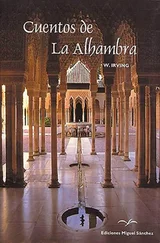Washington Irving - The Alhambra
Здесь есть возможность читать онлайн «Washington Irving - The Alhambra» — ознакомительный отрывок электронной книги совершенно бесплатно, а после прочтения отрывка купить полную версию. В некоторых случаях можно слушать аудио, скачать через торрент в формате fb2 и присутствует краткое содержание. Жанр: unrecognised, на английском языке. Описание произведения, (предисловие) а так же отзывы посетителей доступны на портале библиотеки ЛибКат.
- Название:The Alhambra
- Автор:
- Жанр:
- Год:неизвестен
- ISBN:нет данных
- Рейтинг книги:5 / 5. Голосов: 1
-
Избранное:Добавить в избранное
- Отзывы:
-
Ваша оценка:
- 100
- 1
- 2
- 3
- 4
- 5
The Alhambra: краткое содержание, описание и аннотация
Предлагаем к чтению аннотацию, описание, краткое содержание или предисловие (зависит от того, что написал сам автор книги «The Alhambra»). Если вы не нашли необходимую информацию о книге — напишите в комментариях, мы постараемся отыскать её.
The Alhambra — читать онлайн ознакомительный отрывок
Ниже представлен текст книги, разбитый по страницам. Система сохранения места последней прочитанной страницы, позволяет с удобством читать онлайн бесплатно книгу «The Alhambra», без необходимости каждый раз заново искать на чём Вы остановились. Поставьте закладку, и сможете в любой момент перейти на страницу, на которой закончили чтение.
Интервал:
Закладка:
Washington Irving
The Alhambra
PUBLISHER NOTES:
✓ VISIT OUR WEBSITE:
LyFreedom.com
THE ALHAMBRA
THE JOURNEY
IN the spring of 1829, the author of this work, whom curiosity had brought into Spain, made a rambling expedition from Seville to Granada in company with a friend, a member of the Russian Embassy at Madrid. Accident had thrown us together from distant regions of the globe and a similarity of taste led us to wander together among the romantic mountains of Andalusia. Should these pages meet his eye, wherever thrown by the duties of his station, whether mingling in the pageantry of courts, or meditating on the truer glories of nature, may they recall the scenes of our adventurous companionship, and with them the recollection of one, in whom neither time nor distance will obliterate the remembrance of his gentleness and worth.[1]
And here, before setting forth, let me indulge in a few previous remarks on Spanish scenery and Spanish travelling. Many are apt to picture Spain to their imaginations as a soft southern region, decked out with the luxuriant charms of voluptuous Italy. On the contrary, though there are exceptions in some of the maritime provinces, yet, for the greater part, it is a stern, melancholy country, with rugged mountains, and long sweeping plains, destitute of trees, and indescribably silent and lonesome, partaking of the savage and solitary character of Africa. What adds to this silence and loneliness, is the absence of singing-birds, a natural consequence of the want of groves and hedges. The vulture and the eagle are seen wheeling about the mountain-cliffs, and soaring over the plains, and groups of shy bustards stalk about the heaths; but the myriads of smaller birds, which animate the whole face of other countries, are met with in but few provinces in Spain, and in those chiefly among the orchards and gardens which surround the habitations of man.
In the interior provinces the traveller occasionally traverses great tracts cultivated with grain as far as the eye can reach, waving at times with verdure, at other times naked and sunburnt, but he looks round in vain for the hand that has tilled the soil. At length he perceives some village on a steep hill, or rugged crag, with mouldering battlements and ruined watchtower: a stronghold, in old times, against civil war, or Moorish inroad; for the custom among the peasantry of congregating together for mutual protection is still kept up in most parts of Spain, in consequence of the maraudings of roving freebooters.
But though a great part of Spain is deficient in the garniture of groves and forests, and the softer charms of ornamental cultivation, yet its scenery is noble in its severity and in unison with the attributes of its people; and I think that I better understand the proud, hardy, frugal, and abstemious Spaniard, his manly defiance of hardships, and contempt of effeminate indulgences, since I have seen the country he inhabits.
There is something, too, in the sternly simple features of the Spanish landscape, that impresses on the soul a feeling of sublimity. The immense plains of the Castiles and of La Mancha, extending as far as the eye can reach, derive an interest from their very nakedness and immensity, and possess, in some degree, the solemn grandeur of the ocean. In ranging over these boundless wastes, the eye catches sight here and there of a straggling herd of cattle attended by a lonely herdsman, motionless as a statue, with his long slender pike tapering up like a lance into the air; or beholds a long train of mules slowly moving along the waste like a train of camels in the desert; or a single horseman, armed with blunderbuss and stiletto, and prowling over the plain. Thus the country, the habits, the very looks of the people, have something of the Arabian character. The general insecurity of the country is evinced in the universal use of weapons. The herdsman in the field, the shepherd in the plain, has his musket and his knife. The wealthy villager rarely ventures to the market-town without his trabuco, and, perhaps, a servant on foot with a blunderbuss on his shoulder; and the most petty journey is undertaken with the preparation of a warlike enterprise.
The dangers of the road produce also a mode of travelling resembling, on a diminutive scale, the caravans of the East. The arrieros, or carriers, congregate in convoys, and set off in large and well-armed trains on appointed days; while additional travellers swell their number, and contribute to their strength. In this primitive way is the commerce of the country carried on. The muleteer is the general medium of traffic, and the legitimate traverser of the land, crossing the peninsula from the Pyrenees and the Asturias to the Alpuxarras, the Serrania de Ronda, and even to the gates of Gibraltar. He lives frugally and hardily: his alforjas of coarse cloth hold his scanty stock of provisions; a leathern bottle, hanging at his saddle-bow, contains wine or water, for a supply across barren mountains and thirsty plains; a mule-cloth spread upon the ground is his bed at night, and his pack-saddle his pillow. His low, but clean-limbed and sinewy form betokens strength; his complexion is dark and sunburnt; his eye resolute, but quiet in its expression, except when kindled by sudden emotion; his demeanor is frank, manly, and courteous, and he never passes you without a grave salutation: “Dios guarde à usted!” “Va usted con Dios, Caballero!” “God guard you!” “God be with you, Cavalier!”
As these men have often their whole fortune at stake upon the burden of their mules, they have their weapons at hand, slung to their saddles, and ready to be snatched out for desperate defence; but their united numbers render them secure against petty bands of marauders, and the solitary bandolero, armed to the teeth, and mounted on his Andalusian steed, hovers about them, like a pirate about a merchant convoy, without daring to assault.
The Spanish muleteer has an inexhaustible stock of songs and ballads, with which to beguile his incessant wayfaring. The airs are rude and simple, consisting of but few inflections. These he chants forth with a loud voice, and long, drawling cadence, seated sideways on his mule, who seems to listen with infinite gravity, and to keep time, with his paces, to the tune. The couplets thus chanted are often old traditional romances about the Moors, or some legend of a saint, or some love-ditty; or, what is still more frequent, some ballad about a bold contrabandista, or hardy bandolero, for the smuggler and the robber are poetical heroes among the common people of Spain. Often, the song of the muleteer is composed at the instant, and relates to some local scene, or some incident of the journey. This talent of singing and improvising is frequent in Spain, and is said to have been inherited from the Moors. There is something wildly pleasing in listening to these ditties among the rude and lonely scenes they illustrate; accompanied, as they are, by the occasional jingle of the mule-bell.
It has a most picturesque effect also to meet a train of muleteers in some mountain-pass. First you hear the bells of the leading mules breaking with their simple melody the stillness of the airy height; or, perhaps, the voice of the muleteer admonishing some tardy or wandering animal, or chanting, at the full stretch of his lungs, some traditionary ballad. At length you see the mules slowly winding along the cragged defile, sometimes descending precipitous cliffs, so as to present themselves in full relief against the sky, sometimes toiling up the deep arid chasms below you. As they approach, you descry their gay decorations of worsted stuffs, tassels, and saddle-cloths, while, as they pass by, the ever ready trabuco, slung behind the packs and saddles, gives a hint of the insecurity of the road.
Читать дальшеИнтервал:
Закладка:
Похожие книги на «The Alhambra»
Представляем Вашему вниманию похожие книги на «The Alhambra» списком для выбора. Мы отобрали схожую по названию и смыслу литературу в надежде предоставить читателям больше вариантов отыскать новые, интересные, ещё непрочитанные произведения.
Обсуждение, отзывы о книге «The Alhambra» и просто собственные мнения читателей. Оставьте ваши комментарии, напишите, что Вы думаете о произведении, его смысле или главных героях. Укажите что конкретно понравилось, а что нет, и почему Вы так считаете.












